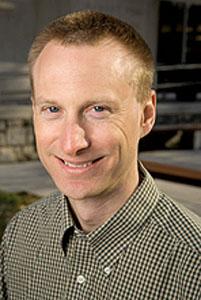 |
We asked College Librarian Bryn Geffert about the books on his figurative bedside table. Here’s what he told us:
Reading with my son before bedtime prayers provides an excuse to revisit childhood classics. We recently finished My Side of the Mountain, a sweet if sometimes didactic tale of a young boy who runs away from home and survives a year in the Catskills in a hollowed-out tree. We’re now in the middle of The Adventures of Huckleberry Finn, with frequent breaks for difficult discussions. (Try explaining to an 8-year-old the various uses of a racial slur by characters both sympathetic and odious.) It’s fun to observe a child who’s just beginning to appreciate irony try to puzzle out the notion of an unreliable narrator.
I’ve spent most of my own reading hours lately churning through primary texts that I and a colleague at the University of Minnesota are considering for inclusion in a documentary history of Eastern Orthodoxy. Early in the project one of my research assistants became so enamored with The Life of St. Antony, by Athanasius, that I feared she was about to jump a plane to Cairo and make her way into the Nitrian Desert by camel. (I did not relish the thought of making that phone call to her parents.) I’m now enjoying 26 Moskovskikh prorokov, iurodivykh, dur i durakov (“26 Moscow Prophets, Holy Fools, and Fools”), a clumsy, ill-informed and endlessly entertaining attempt by an early-20th-century skeptic to debunk the tradition of holy foolishness in Russia.
I try to stay current, usually unsuccessfully, with new works in Russian history. I enjoyed Lewis Siegelbaum’s Cars for Comrades, a careful piece of social history examining attempts by Soviet industrial planners to fix the place of luxury items in a society that could never quite decide whether luxury was appropriate, and, if so, under what circumstances and for whom. Laurie Manchester’s Holy Fathers, Secular Sons brilliantly scrutinizes the tenuous place of the parish priest in Russian society. And I’m re-reading Georges Florovsky’s cantankerous Ways of Russian Theology—an argument that Russian theology abandoned its Byzantine roots for Western ways—in my attempt to keep pace with Vera Shevzov at Smith, who told me last week that Florovsky has it all wrong.
I just finished The Most Famous Man in America by the irrepressible Debby Applegate ’89. (Aside: You, dear reader, can join this Pulitzer Prize-winning author as a member of the illustrious Friends of the Library for the ridiculously low fee of $35 per year. Our lines are open now.) And I loved Richard Russo’s That Old Cape Magic, a novel almost as funny—although not as savage—as Straight Man, his classic satire of academic life. Nobody ridicules the lot of us as well as Russo.